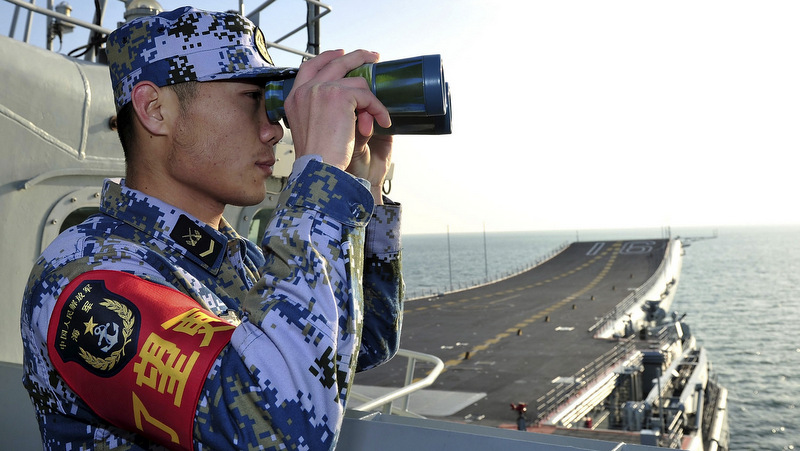The trade war between the US and China is turning into a hot war with every passing day.
As we reported on Monday, Chinese ships came to actively confronting the USS Decatur while the US ship was carrying out yet another in a series of “freedom of navigation” operations – or “freeops” – in the South China Sea. The Navy destroyer had to maneuver to avoid colliding with the Chinese destroyer Luyang that came within 45 yards of its bow while the Decatur was sailing through the Spratley Islands on Sunday in what was the closest direct confrontation between US and Chinese ships since Trump’s inauguration (after which the Navy began conducting these freeops with increasing frequency).
On Tuesday, China accused the US of violating its “indisputable sovereignty” over the Spratley islands, saying in a statement “We strongly urge the U.S. side to immediately correct its mistake and stop such provocative actions to avoid undermining China-U.S. relations and regional peace and stability.”
Now it’s the US turn to respond, and according to CNN, the US Navy’s Pacific Fleet has drawn up a classified proposal to carry out a global show of force as a warning to China and demonstrate the US is prepared to deter and counter their military actions. The draft proposal from the Navy is initially recommending the US Pacific fleet conduct a series of operations during a single week in November.
The navy’s goal – whether with or without the White House’s prodding – is to carry out a highly focused and concentrated set of exercises involving US warships, combat aircraft and troops to demonstrate that the US can counter potential adversaries quickly on several fronts.
Even without knowing the details, one can easily see how this can go horribly wrong. It only gets worse from there.
The plan suggests sailing ships and flying aircraft near China’s territorial waters in the South China Sea and Taiwan Strait in freedom of navigation operations, to demonstrate the right of free passage in international waters. Naturally, the proposal means US ships and aircraft would operate close to Chinese forces.
One wonders if the US Navy considered how it would react if Chinese battleships were sailing in circles in “international waters” in the Gulf of Mexico, or off the California coast for example.
There’s some good news: the defense officials emphasized that there is no intention to engage in combat with the Chinese.
And while the US military carries out these types of operations throughout the year, the proposal being circulated calls for several missions to take place in just a few days, an escalation that is sure to infuriate China.
So are the US and China on the verge of a shooting war? While one official described it as “just an idea”, it is said to be far enough along that there is a classified operational name attached to the proposal, which is circulating at several levels of the military. According to CNN, officials would not confirm the name of the potential operation.
The good news is that the US at least realizes that by pursuing this kind of naval action – one which would be equivalent to sending a bull in a China sea – US officials acknowledge China often see these missions as “provocations.” They also acknowledge that the intelligence community would have to weigh in with any concerns about reactions from China.
Which, however, will not stop the US; in fact, this may simply be the latest distraction pursued by the Trump administration:
The proposal is being driven by the military but carrying it out it during November when US mid-term elections are taking place could have political implications for the Trump administration if the US troops are challenged by China.”
And where this strategy goes off the rails is that instead of just provoking China in its back yard, the US intends to do it, well, everywhere around the world. While the proposal for now focuses on a series of operations in the Pacific, near China, they could stretch as far as the west coast of South America where China is increasing its investments. If the initial proposal is approved, the missions could be expanded to Russian territory, because the only thing smarter than provoking China is provoking China and Russia.
Defense Secretary James Mattis and General Joseph Dunford, chairman of the Joint Chiefs of Staff, will take into account the diplomatic implications of each mission, officials said. They will also have to consider the risk of suddenly moving forces to new areas away from planned deployments, and whether potential threat areas are being left uncovered by the military, especially in the Middle East.
The proposal – which was still being considered within the military – grew out of the Pentagon’s National Defense Strategy which focuses on the growing military challenge posed by the Chinese and Russian militaries. Mattis has urged US commanders to come up with innovative and unexpected ways to deploy forces. Currently the aircraft carrier Harry S Truman is taking the unexpected step of operating in the North Sea – sending a signal to Russia that US military forces can extend their reach to that area. Next: several aircraft carriers parked in the South China Sea… just to send China a “signal”, one which China will waste no time responding to.
Top Photo | In this Tuesday, Nov. 26, 2013 photo, a crew member of Chinese People’s Liberation Army (PLA) Navy monitors on the deck of the China’s aircraft carrier, the Liaoning, sailing on the East China Sea for sea trials. (AP Photo)


